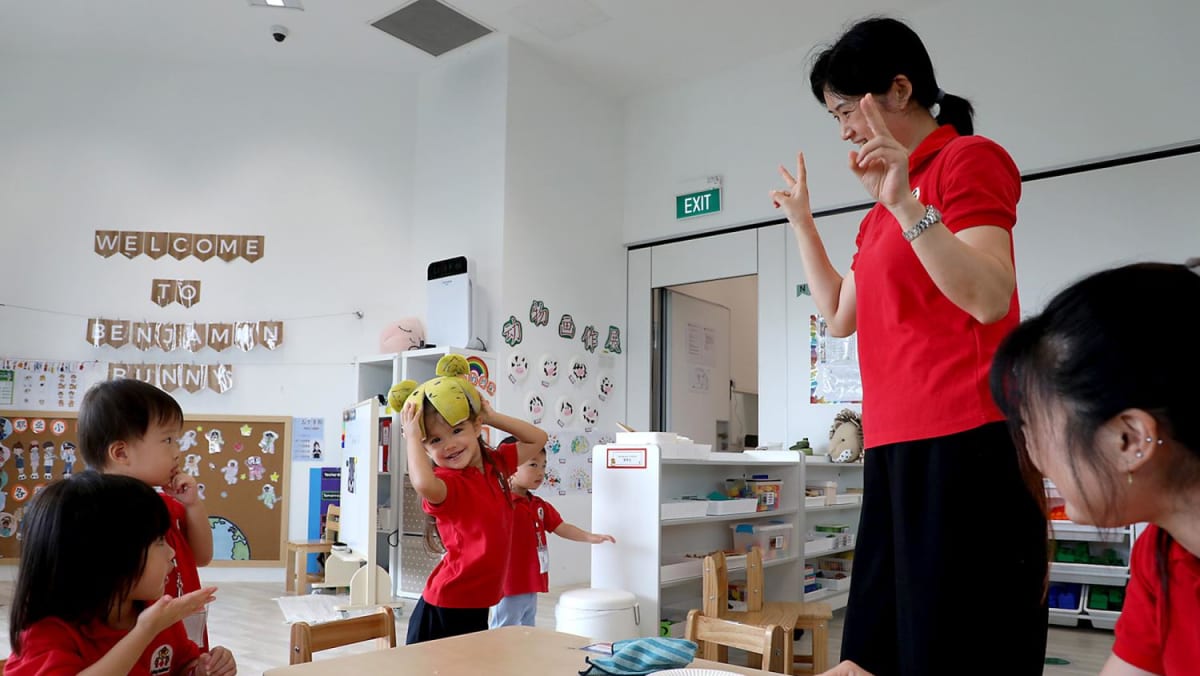
SINGAPORE — With more than 1,600 childcare centres and close to 380 kindergartens offering the promise of an enriching preschool education around the country, how should parents decide where to send their children?
Safety measures in preschools have been on Singaporeans’ minds in recent weeks after Kinderland, a private preschool which charges parents upwards of S$1,700 for its programmes, made headlines for several cases of child mismanagement.
Early childhood professionals told TODAY that a higher price point does not automatically equate to a better quality, or safer, programme.
Instead, in making their decision, parents should base their considerations around a process involving their “head, heart and gut”, said Ms Melissa Goh-Karssen, a senior lecturer for the early childhood education programme at the Singapore University of Social Sciences.
‘HEART’: CONSIDER CENTRE’S VALUES AND TEACHING APPROACHES
The next thing parents should do is to assess the centre’s broader values, curriculum and teaching approaches — elements assessed with the “heart”, said Ms Goh-Karssen.
Parents should consider whether these factors resonate with their own beliefs in education and what they might want for their children.
“You want to look at the tangible practices and actions of the centre, because whatever the centre does — whatever you see in their day-to-day practices — is going to be there in the long run because this is the philosophy of the school,” she said.
“Otherwise, what you’re going to end up with in the long run is a lot of complaints… because fundamentally, it just wasn’t a centre for you to begin with.”
Mrs Marian Lee, the centre head of a Ministry of Education (MOE) kindergarten located at West Spring Primary School, agreed.
“I’ve always told parents that when you’re selecting a school, you must find one that you can identify with, in terms of your own priorities for the children,” she said.
That may mean choosing a school with a heavier focus on academics or one that prefers a more holistic approach that encompasses the imparting of social skills, she said.
Mrs Lee, who was also part of the pioneering team that set up MOE kindergartens in 2014, said that she has observed in recent years an increasing number of children in kindergartens who have trouble with their inhibitory control, partly due to the Covid-19 pandemic.
Inhibitory control is a set of mental skills that include self-control. Children with a lack of inhibitory control may have emotional meltdowns, anger management issues and an inability to focus.
“We are seeing a lot more of these challenges in children because overexposure to screen time at too young an age does impair some aspects of brain development,” Mrs Lee said.
When children with such issues enter primary school, “the transition will be a lot tougher”, she added.
In preparing for that transition and deciding on a school’s suitability, Ms Goh-Karssen said that parents should perform an honest assessment of the skills that their children might be weak in.
“If I know that my child is struggling with social-emotional things, then should your focus be on social-emotional, or building your child’s literacy? I would say social-emotional, because you want to ensure that there is a solid foundation,” she said.
It is also important for parents to consider their child’s learning style and preferences when choosing a school.
“If your child is not a child who takes to that teaching approach, for example, even as a parent, you can put your child in that setting, but it may not do your child justice,” said Ms Goh-Karssen.
“That means your child might end up feeling less off than more off.”
‘GUT’: VISITING CENTRES IN PERSON, TRUSTING INSTINCT
It is imperative for parents to visit the centres they have shortlisted in-person and to trust their instincts, said Ms Goh-Karssen.
And parents should make such visits while actual lessons are taking place, added Ms Seri, as the children’s behaviour can give clues about the relationship between the teachers and their students.
A child’s gloomy disposition upon entering the front door, children keeping mostly quiet or being reluctant to engage with the teacher and their peers can be “indicators” or a reflection of the school’s culture.
“Children’s expressions cannot lie… If it’s good and energetic, then it’s a sign the activities are developmentally appropriate for the children,” Ms Seri said.
When it comes to assessing the teaching staff themselves, parents should look beyond their academic qualifications or their years of experience in the field, said Ms Goh-Karssen, adding that it is “unrealistic” to expect to find fully experienced teachers at one centre due to the shortage of early childhood educators.
How one feels about the teachers at the centre, including its principal, “is always of utmost importance”, she said.
“You want to think not just about the competencies of the teachers, but also how they work together,” she said.
“Inevitably, it will affect and influence the learning and development of the child. Because the adults within the child’s world have a direct impact.”
Regardless of which school parents choose, Ms Goh-Karssen believes that they should adopt a mindset that schools are only playing a “supportive role” in a child’s learning and development, and that the primary responsibility still lies with the family.
“Organisations may change management anytime. Preschools update and review their curriculum approach and their standards periodically as well. Centre leaders and teachers come and go,” she said.
“We cannot take that mindset where we believe that the school takes on the primary role of developing and teaching our children, because if we have that mindset, when things change in a school, it’s going to drastically affect the children.”
Ms Goh-Karssen said this shift in mentality would boost a child’s ability to overcome challenges “regardless of what changes might happen”.
“I think it will be a whole lot more positive… because the home foundation has played a good factor in that stability for the child.”